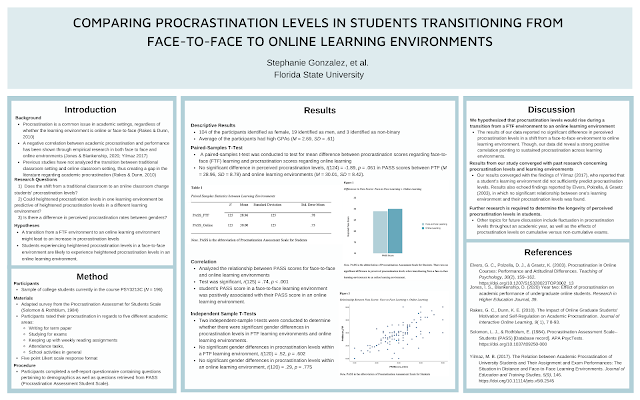Psychological Approaches Lesson Plan
Created for a primary Introduction to English Studies course, this lesson takes Rob Pope's exploration of psychological approaches within literature analysis into consideration for the purpose of leading a single lecture on one's chosen approach to analyzing literature. This lecture content was created with an intent to further educate students on Pope's theory regarding psychological approaches to literary analysis, combined with a verbal presentation of the content followed by a Q&A section.
Mock Research: Analysis of Procrastination Levels in Students Transitioning from Face-to-Face to Online Learning Environments
While the literature linking procrastination and self-efficacy issues is extensive, this study stands to address a gap in the research regarding a possible third variable problem concerning the structure of the learning environment. Through this study, my research group gathered data from a convenience sampling of FSU students enrolled in a fall session of a Research Methods in Psychology course, immediately following the transition from a face-to-face, traditional format to an exclusively online course-delivery system. We ran a Paired-samples t-Test, a correlation, and an Independent sample t-Test on the data to determine whether procrastination levels rose during this transition, for which we found no significant changes to perceived procrastination levels. While there were no significant findings relating to a shift in procrastination levels during this transition, the findings of this data did reveal a strong positive correlation pointing to sustained procrastination across learning environments. FSU students within our study with heightened procrastination levels in a face-to-face learning environment were found to have sustained procrastination levels when transitioning from a face-to-face learning environment to an online learning environment. While this is an informal study meant to strengthen research skills throughout an undergraduate program, we feel as though this finding suggests a necessity for analysis into the subject of academic procrastination.




Social Icons